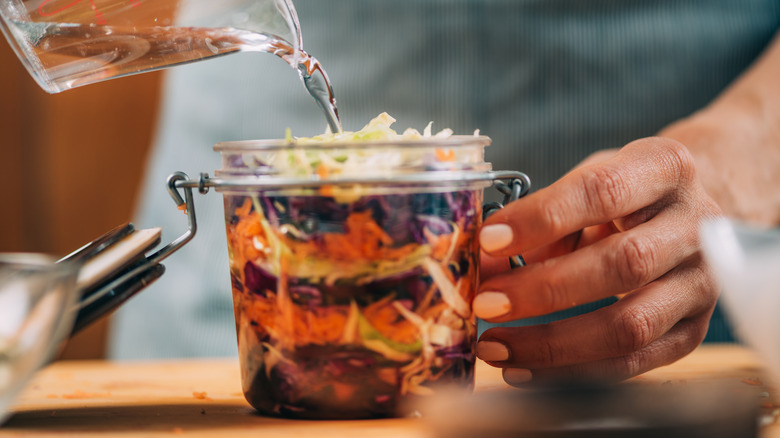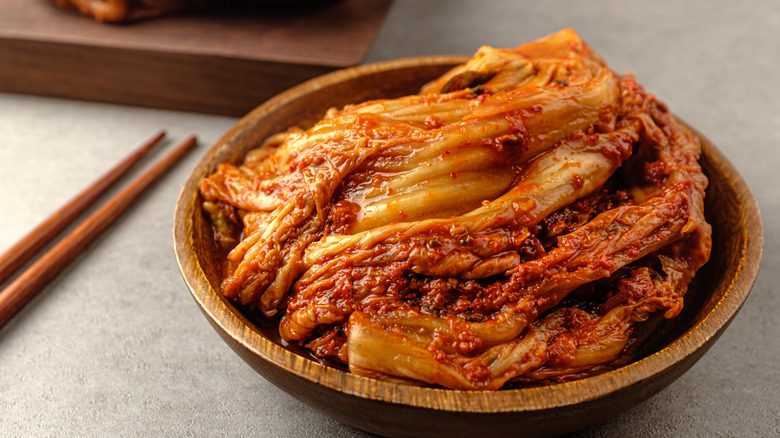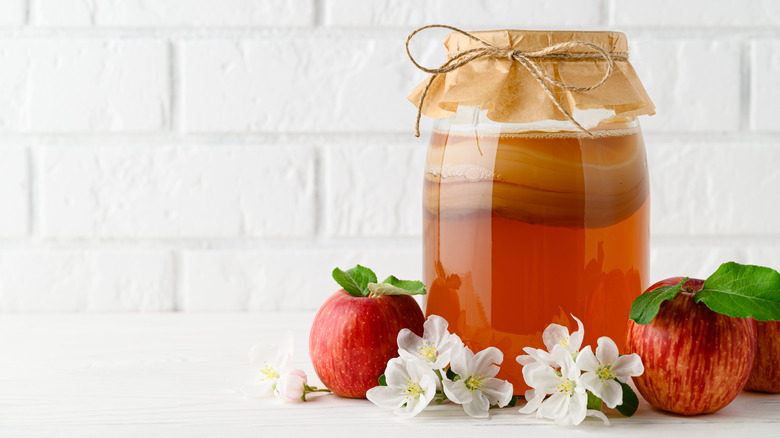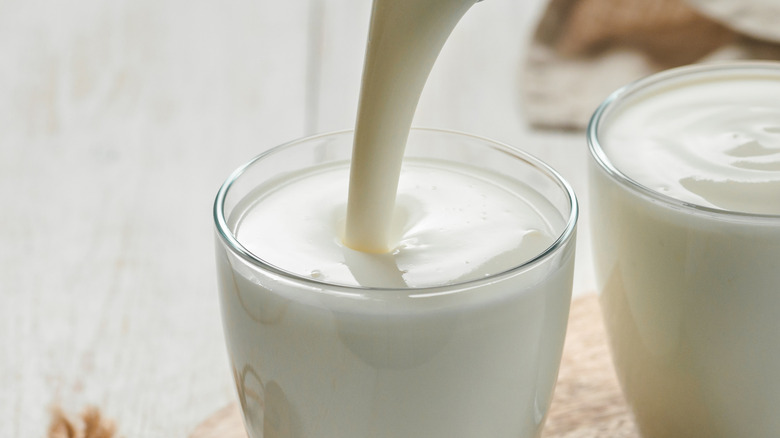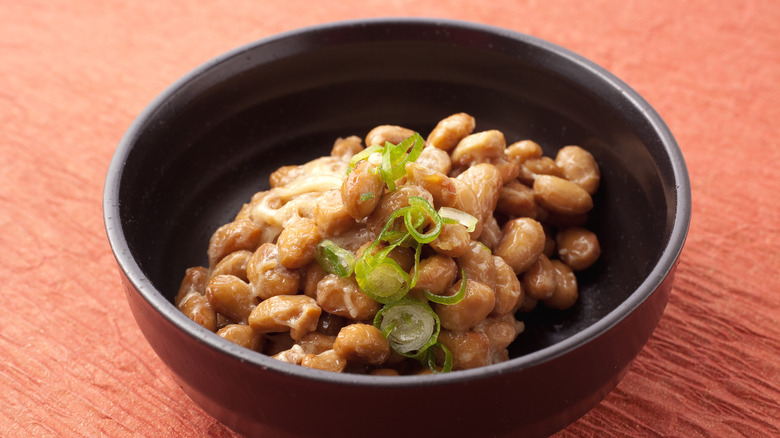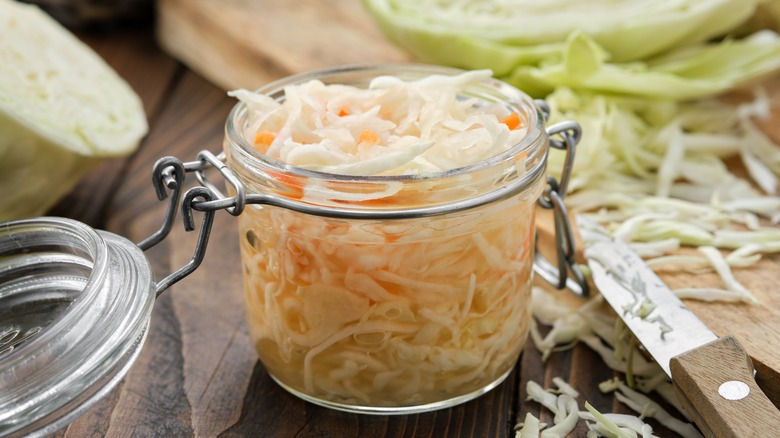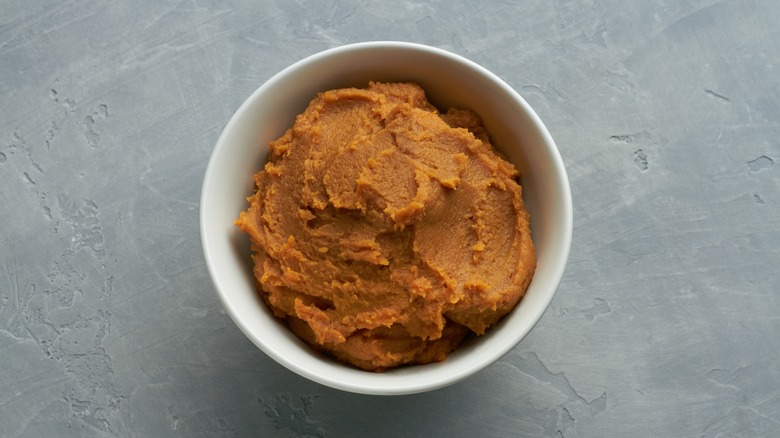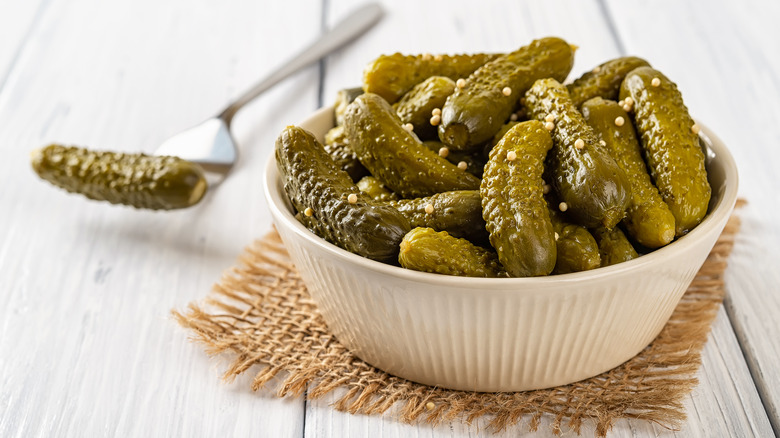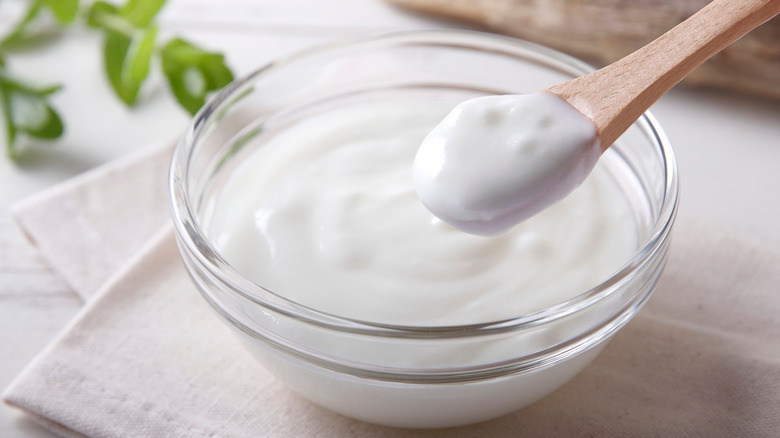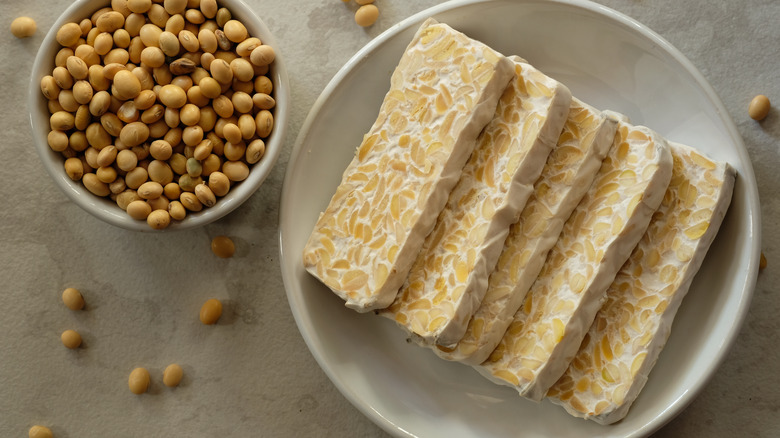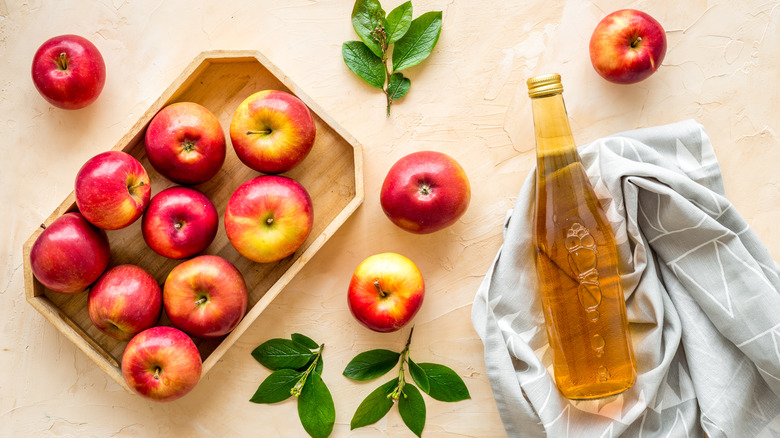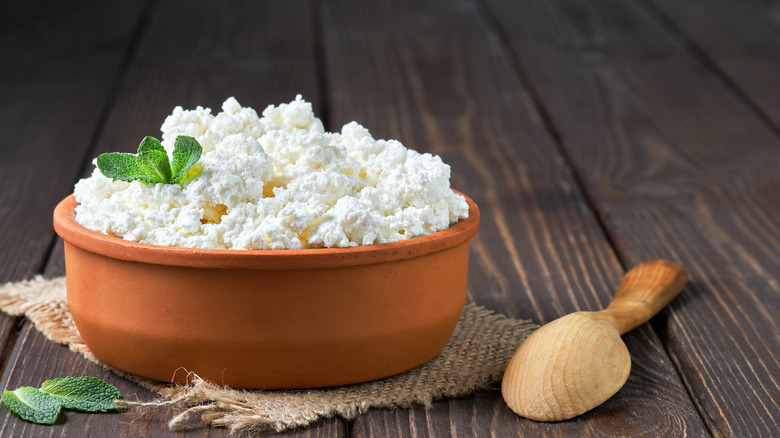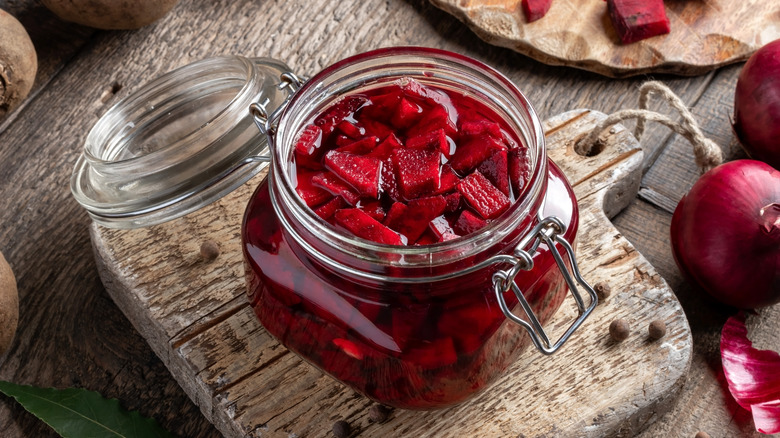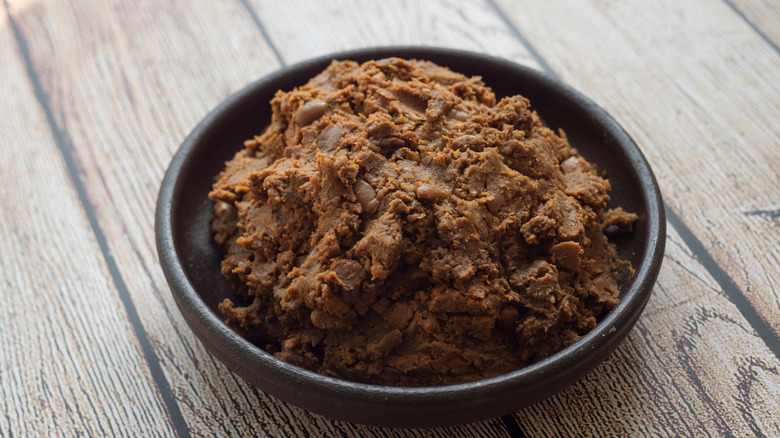14 Fermented Foods You Should Be Eating
Fermented foods have been around as long as food preparation has been recorded in modern history. But for whatever reason, it feels like knowledge of their health benefits has only reached mainstream attention relatively recently. And pound for pound, there are fewer foods that offer as much nutritional bang for their buck as some fermented foods readily available, particularly for your gut. "The fermentation process produces bacteria that are believed to be good for our health and may also have a higher content of certain vitamins," says Eve Kalinik, nutritionist, gut health specialist, and author of "Be Good To Your Gut" in Cosmopolitan.
But while most people might think there are just one or two fermented foods out there (we're looking at you, kimchi and sauerkraut), the fermentation process is involved in a huge amount of food products. And while each of them can help provide the gut-healthy bacteria so prized by fermented food lovers, they also have their own nutritional benefits. Here at Health Digest, we're unscrewing the lid and releasing the potent powers of these fermented friends.
Kimchi
Honestly, what would this world be without kimchi? The fermented side dish has been a staple in Korean cuisine for thousands of years, and its popularity has now spread to pretty much every corner of the globe. Aside from its unique, delicious taste, one of the reasons why it has exploded in appeal is due to its health benefits. NYC-based dietitian Samantha Cassetty states to Women's Health that kimchi is rich in probiotics, helping to maintain and improve the balance of healthy bacteria in your gut, thereby helping your digestion function correctly. And this digestive function also aids your immunity, because as registered dietitian Jessica Cording states, "the majority of immune function takes place in the gut."
And that's not all, folks. Kimchi's composition of vegetables, peppers, and ginger means that it's packed with antioxidants that benefit your health in even more ways. "Antioxidants help stabilize damaged cells that can accelerate the disease process, so having a high antioxidant status can protect you from chronic conditions, like heart disease," says Cassetty. Add to that the fact that the antioxidants in kimchi may help to maintain eye health, and the digestive benefits may help protect your brain, and you can see why you need to pick up a jar ASAP.
Kombucha
Once upon a time, kombucha was a little-known product in the United States. Nowadays, kombucha is virtually everywhere you look, and can provide powerful health benefits to boot. The fermented, sweetened drink, made through fermenting tea with a SCOBY, has ample nutritional content, according to Forbes. Like other fermented food and drink, kombucha's production creates a multitude of probiotic bacteria, which registered nutritionist Jo Lewin states can have a positive effect on your gut and digestive health (per BBC Good Food).
What's more, the fact that kombucha is made from tea, a drink high in antioxidants called polyphenols, means that its antioxidant content is pretty high. These antioxidants can have positive effects on heart health and the balancing of cholesterol to healthy levels, advises Lewin. Kombucha is generally drinkable by most people, but as the beverage is high in histamine (which is the case for other fermented food products), anyone with histamine intolerance should watch out when drinking it. Drinking large amounts of kombucha may also occasionally produce side effects like dizziness or stomach ache in some individuals, Lewin adds.
Sourdough bread
We all know that bread gets a bad rap these days, but certain types of bread can interact with your health in positive ways. Such is the case with sourdough bread, a type of bread made through the fermentation of flour and water, notes registered dietitian Jessica Ball for Eating Well. This fermented quality can prep your stomach for an abundance of healthy bacteria. Interestingly, sourdough bread may also help your body digest gluten — despite containing it — with more efficiency, due to the fermenting of the dough altering the gluten structure, says Ball. Having said that, Ball does stress that for individuals with gluten intolerance or sensitivity that eating sourdough may still not be suitable or safe.
Sourdough bread is also chock-full of B vitamins, which can help your body process and produce energy. And perhaps coolest of all: Despite some bread's reputation for causing blood sugar spikes, sourdough bread may help regulate your blood sugar more effectively, again through the structure of the bread being changed by the fermentation process, according to WebMD. The change in molecules causes your body to digest them at a slower pace, meaning your blood sugar rises more slowly, avoiding a drastic rise and fall.
Kefir
As with other fermented foods, kefir has taken center stage recently, but as Healthline notes it's been a fixture of menus worldwide since time immemorial. But more and more people are cottoning on to the health benefits of kefir, which can provide even more of a probiotic kick than its dairy sibling yogurt. The probiotics present in kefir can also have antibacterial properties and may help inhibit the growth of foodborne bacteria.
Kefir's composition, made of dairy, also gives it many benefits that other fermented foods may not deliver. Kefir is high in protein and both calcium and K2, the vitamin that helps your body process calcium, and these combined allow the drink to play a vital role in the maintenance of bone and tooth health. Unlike other dairy products, kefir is relatively low in lactose, and so may be easier to digest for those with lactose intolerance. It's worth pointing out, as well, that dairy-free versions of kefir exist, for those with more severe lactose intolerances or following diets that omit dairy. These versions, however, may not have the same nutritional profile as dairy-based kefir.
Natto
If you haven't tried natto yet, you're missing out. This unique food product, made of fermented soybeans, is popular across Japan and is gradually making itself more known to consumers in the United States. Natto is a high-fiber, high-protein food that's also full of healthy polyunsaturated fats, according to Verywell Fit. As well as this, the dish is loaded with vitamins and minerals, and is particularly high in manganese, delivering way more than your daily requirement in just one serving. Vital for the support of enzymes and healthy blood clotting, manganese is joined in natto by large levels of iron, copper, vitamin C, potassium, zinc, various B vitamins, and high amounts of vitamin K2.
All of these components add up to make natto a powerful dietary addition that could help in the maintenance of blood pressure, lower the risk of cardiovascular disease, help maintain bone health, and support good gut function. If you're unfamiliar with natto, it's also a cinch to eat. Simply pile it onto a generous serving of white rice, and add a little soy sauce, nori, bonito, or wasabi to taste, suggests The Spruce Eats.
Sauerkraut
It's pretty likely that if you've ever been to a football game or a fair, you've had sauerkraut — it's usually piled onto a hot dog. But you may not be aware you were eating a fermented food that your body will love you for. Sauerkraut has been observed to have several potential positive effects on health, as noted by research published in Global Advances in Health and Medicine. In addition to its fiber-rich composition that's packed with vitamins and minerals, sauerkraut may also help to support the immune system through its promotion of gut-friendly bacteria, and the cabbage that it comes from is full of antioxidants that have powerful disease-fighting potential, according to Healthline.
The fermented nature of sauerkraut — and the healthy bacteria and boost in gut health that come with that — may also help to support brain health and reduce stress and mental health conditions, according to research published in Gut Pathogens. One thing to bear in mind with sauerkraut though is its sodium content. As salt is added to initiate the fermenting and flavoring process, it's useful to check the label of any brand you buy, so you know exactly how much you're getting.
Miso
Like natto, miso is a stalwart of the national diet of Japan. And this fermented soy paste, used as an ingredient in a huge range of Japanese dishes, could have a wide range of potential health benefits that might have you using it in your home cooking. Miso's fermented nature means that it's a powerful digestive aid, states registered dietitian Novella Lui for Eating Well, with the paste helping to support proper digestion, reduce gas and bloating, and support the immune system. More specifically, miso may also help bring down the potential of developing inflammatory bowel disease, as research published in Gastroenterology states.
What's more, despite its high sodium content, miso may be less impactful on your risk of developing stomach cancer when compared to other foods like pickles or processed meats, a study from Clinical Nutrition shows. It's worth keeping in mind, though, that like some other fermented foods, miso is fairly high in sodium, and so those watching their sodium intake may want to limit the amount they eat. As some types of miso may also contain gluten, it's also important for those with gluten intolerance or sensitivity to double-check the type they buy first.
Pickles
As a regular fixture of pretty much every fridge around the country, it's easy to forget that pickles can be fermented. And while your average dill pickle off the shelf may not be the fermented kind, we'd recommend trying to seek out versions that have been through the fermentation process, for their powerful probiotic benefits, as dietitian Cynthia Sass states to Health. Lactobacillus, the good bacteria that are presented in fermented pickles, helps to support immune function, and your body process nutrients more efficiently. Not bad for a former cucumber.
However, when you're shopping for fermented pickles, choice is everything. The first thing to do, naturally, is to make sure your pickles are labeled as probiotic or fermented, but you should also take a look at the ingredients list, Sass advises. Try and buy pickle varieties that use as few ingredients as possible in their production process. Additionally, keep an eye on the sodium content of any pickles you buy, as pickles that come in brine tend to be loaded with salt, according to WebMD. With an association between sodium intake and kidney conditions and higher blood pressure, you'll want to try and keep your sodium sources from food as low as possible (per the Harvard T.H. Chan School of Public Health).
Yogurt
Sometimes, the best fermented foods are hiding in plain sight. Yogurt is something that billions of people worldwide consume daily, and for good reason: The common fermented foodstuff is packed full of healthy bacteria including Bifidobacterium and Lactobacillus, according to research published in Nutrition Reviews. These powerful little bacteria could provide health benefits that extend way beyond just keeping your digestion moving, with the study authors stating that, "Epidemiological studies have shown that the consumption of fermented foods is associated with reduced risks of type 2 diabetes, metabolic syndrome, and heart disease, along with improved weight management. The microorganisms present in these foods are suggested to contribute to these health benefits." Thanks, yogurt!
There's also yogurt's nutritional profile to consider, beyond its bacteria-y goodness. Natural yogurts are generally lower in sugar, high in protein, can be low in fat, and super-high in calcium and other useful nutrients, according to Medical News Today. Just remember that for maximum goodness, try and steer away from yogurts that are loaded with artificial sweeteners, sugar, or other flavorings, as these can somewhat offset the healthy nature of the snack.
Tempeh
For individuals who don't eat meat, there is a wide range of alternatives ready to take its place in dishes, and tempeh is stepping up to bat. Believed to have its origins in Indonesia, this millennia-old food is made from lightly fermented, cooked soybeans, which are then usually shaped into a blocks, according to The Spruce Eats. But while tempeh has found fame in the West as a meat substitute, it's far more than that. Not only does it have its own mushroom-like flavor, but tempeh is also nutritional "gold dust," high in protein, low in carbohydrates and fat, and packed full of essential minerals like phosphorus, calcium, and magnesium, states registered nutritionist Nicola Shubrook for BBC Good Food.
As tempeh is made of soy, it's also particularly high in isoflavones. This compound, when occurring in soy products, is potentially beneficial for the reduction of cholesterol, according to research published in The American Journal of Clinical Nutrition. A meta-analysis of randomized controlled trials found that soy isoflavones were particularly associated with the reduction of "bad" LDL cholesterol, as well as cholesterol in general, but didn't seem to affect the "good" HDL cholesterol levels.
Apple cider vinegar
Apple cider vinegar has been used as a home remedy ever since you were tall enough to reach the cookie jar (and way before that, too). And as it turns out, there's a pretty good reason for that. The vinegar, which was prescribed by Hippocrates back in 400 BC for a variety of ailments (per Foundation Florida), is produced by fermenting apple cider. The acetic acid that gives apple cider vinegar its distinctive taste can also have a particularly beneficial effect on blood sugar levels — with the acid working to slow your digestion of starchy foods — preventing a blood sugar spike, according to Verywell Health. Consuming a small amount of apple cider vinegar may also help to lower insulin levels.
Apple cider vinegar is easily used in a large variety of recipes or cuisines and goes equally as well on a salad as it does in a marinade. You can also drink a small amount of apple cider vinegar on its own, diluting it in some water first. And apple cider vinegar can be used topically, for skin conditions like dandruff or acne, or even body odor, although Verywell Health notes that further research is needed to justify its utility in these areas.
Cottage cheese
Cottage cheese is the unassuming MVP of the kitchen, as far as we're concerned. The high-protein, low-fat, super-versatile snack is also the fermented-food-dream and is up there with the best fermented foods to include in your diet, as UMass Chan Medical School advises. While much of cottage cheese's buzz comes from its protein levels, we want to shine a light on its unparalleled vitamin and mineral content, with the cheese boasting almost 40% of your daily selenium content, and a whopping 59% of your vitamin B12 daily recommended intake (per Healthline). Selenium helps to properly process the antioxidants you ingest, and vitamin B12 is particularly important for the formation of DNA, nerve cells, and red blood cells, as the Harvard T.H. Chan School of Public Health states.
That's not to say that we don't have a lot of time for cottage cheese's protein content, though, with the high levels helping to support muscle gain, as well as cell formation and recovery from exercise. Bear in mind that cottage cheese is higher in lactose than other aged cheeses, and as such, may not be suitable for those with lactose sensitivities or lactose intolerance.
Beet kvass
Although fermented foods have taken food industries by storm recently, there are a few out there that may not be as familiar yet to Western consumers. Beet kvass is one such fermented beverage, created by fermenting (you guessed it!) beets in a brine solution, creating a tart, salty drink loaded with probiotics (per Livestrong). The richly-colored drink, which has its origins in Russia, gains particular nutritional potency through the beets that are used to make it, which are loaded with betalains, antioxidant compounds that have anti-inflammatory properties and may serve to complement the treatment of certain chronic conditions.
And while beet kvass is on the salty side of things, this can be surprisingly helpful if you're looking for an exercise recovery drink. "Beet kvass is also rich in potassium and sodium, providing an excellent repletion of electrolytes particularly for athletes or anyone who routinely breaks a sweat," advises registered dietitian Melissa Rifkin to Livestrong. The nitrates present in beet kvass — as a result of the beets used to make them — may also help to make arteries less stiff and bring down high blood pressure. Just be aware that, as a drink on the salty side, the sodium content in beet kvass may cause you to ingest more than you usually might.
Doenjang
Although miso has long been the most well-known soybean paste out there in the United States, doenjang might soon present a challenge to its leadership. Doenjang, created by fermenting soybeans with salt, is widely used in Korean cuisine and has a complex flavor that works with a huge variety of dishes (per Bon Appétit).
And doenjang isn't just useful for its ability to add depth and vibrancy to a meal — it's also pretty darn good for you. As research published in Nutrients discusses, doenjang has been perceived to have some anti-inflammatory, anti-cancer, and anti-hyperglycemic effects in clinical trials. And what's particularly interesting is doenjang's effects on blood pressure. Given that doenjang, like many fermented foods, is high in salt, you might assume that eating it would result in increased evidence of hypertension. But the Nutrients study found that rats that were given doenjang in addition to a high-salt diet actually demonstrated an improvement in blood pressure, compared to rats that were just fed a high-salt diet on its own. As this was an animal study, however, further research may be needed to confirm its universal effects.

